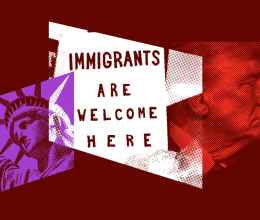This case, like J.B.B.C. v. Wolf, G.Y.J.P. v. Wolf, and Texas Civil Rights Project v. Wolf, challenges the Trump administration’s policy of expelling refugees without any of the protections required by the immigration laws, on the ground that they might have COVID-19 infections. The illegality of that policy is especially clear in cases involving minors who arrive unaccompanied by an adult, because they have special legal protections. Those earlier cases became moot when the government decided not to expel each of the juvenile refugees on whose behalf we had filed suit—while it continued to expel many others.
In this case, we filed a lawsuit on August 14, 2020, together with the ACLU Immigrants’ Rights Project, the Texas Civil Rights Project, and Oxfam America, on behalf of a 16-year-old boy from Guatemala who fled to the United States after he and other family members were threatened with death because of his father’s political opinions. In addition, gang members threatened to kill him when he refused to join their gang. In order to prevent the government from mooting this case, we filed the lawsuit as a class action and filed a motion for class certification together with the complaint, asking to have the case recognized as a class action on behalf of all unaccompanied noncitizen children who are or will be detained in U.S. government custody, and who the government will seek to expel under its new “public health” policy. On August 20, we filed a motion for a preliminary injunction on behalf of all class members.
As in the earlier cases, the government quickly exempted P.J.E.S. from the expulsion process and argued that the case was therefore moot.
The case was assigned to Judge Emmet G. Sullivan, who referred it to Magistrate Judge G. Michael Harvey. On September 25, Judge Harvey issued his Report and Recommendation, agreeing with us that the case could still be certified as a class action even though P.J.E.S. was no longer subject to expulsion. He recommended that the class be provisionally certified, and that a preliminary injunction should be granted, prohibiting the government from expelling members of the class, because the Trump administration’s new policy was probably illegal (as Judge Nichols had also found in the J.B.B.C. case).
On November 18, 2020, the court adopted the recommendations and enjoined the government’s policy. The government appealed. On January 29, 2021, the appeals court stayed the injunction (i.e., allowed the government to resume expelling unaccompanied minors under Title 42). But the next day the Biden administration suspended the expulsion policy for unaccompanied minors. Although our injunction was in place for only about two months prior to the stay, the policy was never reinstated as to unaccompanied minors.
Ultimately, the government’s COVID emergency declaration expired in May 2023, and the entire Title 42 immigration policy (as to adults as well as minors) ended with it. In November 2023, the parties agreed that the preliminary injunction was no longer necessary and stipulated to the dismissal of P.J.E.S. without prejudice.
